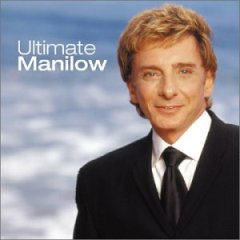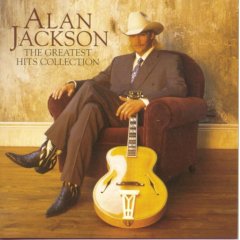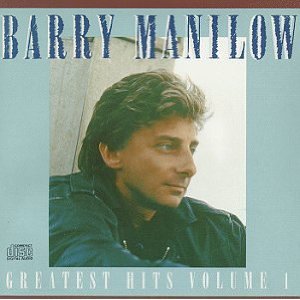
Barry Manilow is an American singer and songwriter with a career that spans six decades. His hit recordings include "Could It Be Magic", "Looks Like We Made It", "Mandy", "I Write the Songs", "Can't Smile Without You", "Weekend in New England", and "Copacabana ".

Barry Manilow is the debut album by Barry Manilow, released initially in 1973 by Bell Records.

Greatest Hits is the first greatest hits album by singer/songwriter Barry Manilow, released in 1978. The album was certified 3× Platinum in the US, and would be Manilow's last of that certification, as of 2021. It also features the new single, "Ready to Take a Chance Again", which reached #11 in the US the same year.

Greatest Hits: The Platinum Collection is a compilation album by American singer-songwriter Barry Manilow, released in 1993. All of the compilation's songs had been previously released, with the exception of the 1993 remixes of "Could It Be Magic" and "I'm Your Man".

Ultimate Manilow is a greatest hits album by Barry Manilow, released in 2002. Nearly every top 20 hit is included in this collection. This compilation is best known for setting the stage for a comeback for Manilow, as it debuted at No. 3 on the charts. While on a six-week tour to promote his latest album Here at the Mayflower, Manilow immediately extended it to a six-month tour. At the time Ultimate Manilow was released, no other compilations of Manilow's music were in print.

The Essential Barry Manilow is a compilation album released by singer and songwriter Barry Manilow in 2005. The album consisted of two CDs, with a total of 34 tracks as part of The Essential series by Sony BMG. In 2010, a limited edition three CD version was released with 8 additional songs.

"Could It Be Magic" is a song written by Adrienne Anderson and composed by American singer-songwriter Barry Manilow, inspired by Frédéric Chopin's Prelude in C minor, Opus 28, Number 20.

The Donna Summer Anthology is a double CD compilation album by the American singer Donna Summer, released by Polygram Records in 1993. The compilation featured the majority of Summer's best known songs right from the start of her success to the then present day. Summer had originally made her name during the disco era in the 1970s and in the decade that followed had experimented with different styles. Most of the tracks on this compilation are the original album versions of the songs, which were sometimes edited down for their release as a single. Included for the first time are two remixed tracks from her then unreleased album I'm a Rainbow, which had been recorded in 1981 but was shelved by her record company. The album also featured the Giorgio Moroder-penned and produced song "Carry On"', marking the first time Summer and Moroder had worked together since 1981. Summer and Moroder, together with Pete Bellotte had written the vast majority of her 1970s disco hits. Four years later, "Carry On" would be remixed and become a big dance hit. It also won Summer a Grammy for Best Dance Recording, her first win since 1984 and her fifth win in total.
Bell Records was an American record label founded in 1952 in New York City by Arthur Shimkin, the owner of the children's record label Golden Records, and initially a unit of Pocket Books, after the rights to the name were acquired from Benny Bell who used the Bell name to issue risque novelty records. A British branch was also active in the 1960s and 1970s. Bell Records was shut down in late 1974, and its assets were transferred to Columbia Pictures' new label, Arista Records.

The Greatest Hits Collection is the first compilation album by American country music artist Alan Jackson. Released on October 24, 1995, it includes the greatest hits from his first four studio albums, as well as an album cut from his 1990 debut Here in the Real World and two new tracks — "Tall, Tall Trees" and "I'll Try", both of which were Number One hits for him on the Billboard Hot Country Songs.

The Complete Collection and Then Some... is a four-disc and one video greatest hits compilation by American pop singer Barry Manilow. It features 70 tracks including unreleased songs and five new recordings. It was certified RIAA gold. Originally released in 1992 with a VHS cassette, this box set was re-released on September 6, 2005, with a DVD replacing the tape.

The Songs 1975–1990 is a Barry Manilow compilation album released in 1990, covering 15 years of chart hits.

The Ultimate Collection is a greatest hits three-CD compilation of recordings by American singer Donna Summer released in the Netherlands in early 2003.

Greatest Hits Volume I is a compilation album released by Barry Manilow in 1989 on Arista Records. It was the first of a three-album series released that year, along with Volume II and Volume III.

Greatest Hits Volume II is a compilation album released by Barry Manilow in 1989 on Arista Records. It was the second of a three-album series released that year, along with Volume I and Volume III.

Greatest Hits Volume III is a compilation album released by Barry Manilow in 1989 on Arista Records. It was the third of a three-album series released that year, along with Volume I and Volume II.

Joyful Jukebox Music is a compilation album by American music group the Jackson 5, released by the Motown label on October 26, 1976, after the band had left the label. This is the third compilation released by the group, after Greatest Hits (1971) and Anthology (1976), yet the first to be entirely composed of previously unreleased material, recorded between 1972 and 1975. The compilation was released less than two weeks before the group's debut on their new label Epic Records.

The Very Best of Barry Manilow is a compilation album released by singer and songwriter Barry Manilow in 2005 for sale at Hallmark stores.
Harry Maslin is an American record producer, recording/mixing engineer, and studio owner/designer.

Greatest Hits – Volume I & Volume II is the first greatest hits album by American singer-songwriter Billy Joel, released on July 1, 1985. The album has been certified double diamond by the RIAA, selling over 11.5 million copies as sixth most certified album of all time in the US. The album includes hits from 1973 to 1985 in chronological order with one exception. Some foreign pressings include "Honesty" in place of "Don't Ask Me Why".


















